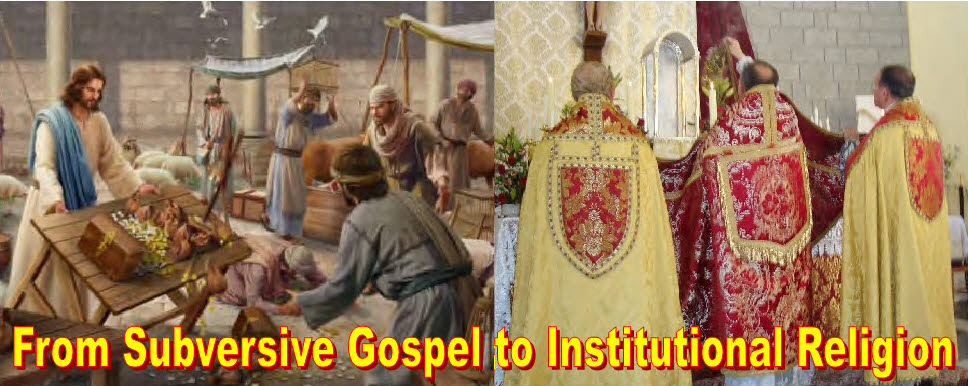









 | 








|
Throughout its history, Christianity has undergone a profound transformation that has significantly distanced it from the original impulse of the Gospel of Jesus of Nazareth. What began as a prophetic, egalitarian, and liberating movement—centered on compassion, justice, and care for others—gradually took the shape of a hierarchical religious institution, structured and aligned with power. This evolution was neither accidental nor merely the result of deviations, but rather the product of complex historical, political, and theological processes, heavily influenced by figures such as Paul of Tarsus. Under his influence, Christianity shifted from being a communal experience rooted in the praxis of love to a faith preoccupied with doctrinal control.
In its origins, Christianity was not a religion in the institutional sense of the word, but a deeply subversive communal experience. Its core was solidarity with the marginalized and a radical critique of religious legalism and imperial power. Jesus of Nazareth did not come to build temples or establish a clerical caste, but to embody a proposal for radical transformation through concrete gestures of justice and compassion. However, after his death, the institutional form Christianity assumed was driven primarily by Paul of Tarsus.
Between the crucifixion of Jesus and the writing of the Gospels, Paul articulated and spread a vision of Christianity centered not on the historical Jesus, but on the glorified Christ, whom he encountered through a mystical experience. This shift moved the focus of the announcement of the Kingdom of God—a concrete and present reality—to a promise of transcendent redemption. Influenced by the dualistic thinking of his time, Paul preached a religion centered on the salvation of the soul, promoting a more passive attitude toward the injustices of the world. Thus, Pauline faith consolidated a Christianity structured around sacrifice, obedience, and ritual, displacing the liberating praxis of Jesus’ original message.
The Gospel, in its essence, was not conceived as a theological treatise or a closed doctrinal system, but as an urgent call to transform life and society from the ground up. It was an invitation to break with oppressive structures and restore dignity—especially that of the most vulnerable—as the central value. The Kingdom that Jesus announced was not an ethereal destination, but a present reality made tangible through inclusion, justice, and radical love.
In contrast to this transformative logic, institutional religion operates under a different dynamic: it relies on myths, rules, and rituals that provide certainty and order, but often sacrifice ethics in the name of control. Thus, it is possible to live an intense religiosity without practicing compassion, even justifying exclusion under the banner of devotion.
From the institutional perspective, the Gospel is subversive. It is the wind of the Spirit that cannot be contained (John 3:8). Jesus did not propose a new religion, but a new way of life centered on the least and the excluded. His gestures—unconditional forgiveness, shared meals with sinners, challenges to religious authorities—embodied a profoundly liberating message.
However, over time, this radical experience lost its prophetic edge. The turning point came with the Edict of Milan (313 CE), when Christianity was legalized and later adopted as the official religion of the Empire. From then on, the Church ceased to be a marginal, countercultural community and became a central player in the administration of power. In this process, Pauline theology was reinforced as a tool for institutional consolidation.
The Church adopted a pyramidal hierarchical structure: the clergy occupied the top, while the faithful remained at the bottom. The Gospel message was ritualized, faith was dogmatized, and obedience canonized. Thus, the “religion of redemption” displaced the Gospel of liberation. In the name of this orthodoxy, various forms of oppression were justified: slavery (1 Cor 7:20–24), the subordination of women (Eph 5:22–24), the condemnation of sexual diversity (Rom 1:24–27), and submission to political power—even to emperors like Nero (Rom 13:1–7).
The figure of the clergy—absent as a caste in the Gospels—was eventually solidified as a hierarchy with privileges, doctrinal authority, and control over spiritual life. What was originally a form of community service became a power structure. Bishops and popes became political figures, more concerned with preserving order than denouncing injustice. Thus, the face of the itinerant Jesus, who had no place to lay his head and embraced the excluded, was replaced by a Church that aspired to thrones and privileges. Already by the third century, as Cyprian warned, there was talk of “clergy” and “laity,” of power and dignity.
This institutionalization entailed a radical transformation of the Christian message. Faith became doctrine, following Jesus became normative obedience, and spirituality became ritualism. The freedom of the Gospel was replaced by obedience. Instead of questioning the status quo, Christianity began to legitimize it.
Paul played an ambivalent role in this process. While he was key to the expansion of Christianity, his vision tended to prioritize individual salvation over social transformation. Thus, religion offered comfort and promises of eternity, but without necessarily challenging the unjust structures of this world. Hope was displaced to the hereafter, while the present remained unchanged.
All of this has created a deep conflict between the Gospel and religion. While religion focuses on saving the individual and easing their conscience, the Gospel calls for decentering the self and placing the other—especially those who suffer—at the center. Religion builds temples and dogmas; the Gospel dismantles structures and liberates consciences. Religion demands obedience; the Gospel calls for freedom and commitment.
This tension is not an outright condemnation of the Church, but an urgent call to distinguish between genuine faith and its institutional distortions. As Jesus said, “The Spirit blows where it wills” (John 3:8), and it cannot be confined by hierarchies or formulas. Attempting to domesticate it is a betrayal of its subversive and liberating essence.
The critique of the institutional Church does not stem from resentment, but from a deep fidelity to the message of Jesus. Recognizing the failures of historical Christianity is not to deny its value, but to open a path toward authenticity. Returning to the Gospel is not a nostalgic gesture, but an act of spiritual justice: it means placing unconditional love, prophetic denunciation, and hope for the suffering at the center of the life of faith.
Authentic Christianity is not defined by the pursuit of power or the imposition of rules, but by freedom, simplicity, and closeness to the poor. It is not a religion that condemns from the pulpits, but a way of life that walks alongside those who suffer. Recovering the Gospel means recovering hope in a world that is more just, more human, and more full of God. And doing so, today, is more urgent than ever.
